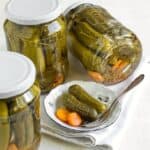
Homemade Dill Pickles (Czech Recipe)
Dill pickles represent one of the staple foods of Czech cuisine. They are canned in sweet and sour brine with the addition of fresh dill, onion, carrot, and aromatic spices. You can easily make these crispy Czech-style dill pickles by following the canning recipe I've provided below, which includes detailed instructions.
Servings 4 jars
Calories 339kcal
Equipment
- 4 1-quart mouth wide jars with rings and new lids
- 1 large stock pot for water bath
- 1 jar lifter
- 1 canning thermometer
Ingredients
- 4 pounds pickling cucumbers (1,8 kg) size 2 1/2-5 inches
Pickling brine:
- 3 ½ cups water (850 ml)
- 2 ½ cups distilled white vinegar (600 ml) 5% acidity
- ¾ cup granulated sugar (150 g)
- 2 Tablespoons salt (35 g)
Herbs and spices:
- 16 allspice (4 per jar)
- 32 peppercorn (8 per jar)
- 4 full dill stems (1 per jar) cut into 2-inch pieces
- 8 cloves (2 per jar) optional
- 16 pieces of sliced carrot (4 per jar)
- 16 onion rings (4 per jar)
- 4 bay leaves (1 per jar)
Instructions
- Washing cucumbers: Place the cucumbers in a plastic tray, cover with lukewarm water and leave to stand for an hour to release the dirt and other impurities. Scrub with a sponge and rinse with clean water. Remove the remaining cucumber stem if there is one.
- Prepare canning jars: 1-quart wide mouth jars with a screw cap are best for pickling cucumbers. Wash the jars and lids thoroughly in soapy water or in the dishwasher.
- Fill the jars: Place a few fresh dill sprigs including the thick stems, onion rings, carrots, allspice, and peppercorn in the bottom of each jar. Stuff the jars tightly with cucumbers. The cukes will shrink and float in the brine when sterilized. Start with larger cucumbers around the perimeter, then fill in the gaps with smaller pickles. If you have any dill left over, put it on top of the cucumbers.
- Boil water for canning in a water bath: Pour water into a canning pot and bring it to a boil. Carefully place a tea towel on the bottom to prevent the jars from cracking when sterilizing or handling.
- Cook pickling brine: In a saucepan, boil water with sugar and salt. When dissolved, remove from the stove and stir in the vinegar. Ladle hot pickling brine over the filled jars leaving about ½ inch head space.
- Sterilization: Screw the jars of pickles in and tighten. Keep the water temperature in the pot at around 185°F/85°C (I am using a canning thermometer). Preferably using a pair of tongs, carefully insert the jars into the pot of water so that they do not touch each other. The water level in the pot should reach about 1 inch below the lid.
- Sterilize for 20 minutes. Then remove the jars with pickles using the lifting tongs, flip them lid side down onto a folded clean kitchen towel or other heat proof surface and let the jars cool completely. Careful, they are hot when taken out of the water bath!
Notes
- Makes four full 1-quart jars of pickles.
- The next day after pickling, push down on the middle of the lid to ensure that the seal has formed. The lid should not move up and down; no clicking or popping sounds should be made. If no seal forms, refrigerate pickles and consume them within one week.
- Let the pickles sit for about three weeks before opening and digging in to soak up the brine thoroughly.
- STORAGE: Store the jars of dill pickles in the pantry in a dark, dry place at room temperature. Stored in this way, they will keep for a year without any problems. Once you have opened the jar of pickles, store it refrigerated and use it within a week.
Nutrition
Calories: 339kcal | Carbohydrates: 75g | Protein: 7g | Fat: 1g | Saturated Fat: 0.2g | Polyunsaturated Fat: 0.3g | Monounsaturated Fat: 0.1g | Sodium: 2466mg | Potassium: 1381mg | Fiber: 12g | Sugar: 49g | Vitamin A: 27459IU | Vitamin C: 42mg | Calcium: 183mg | Iron: 2mg